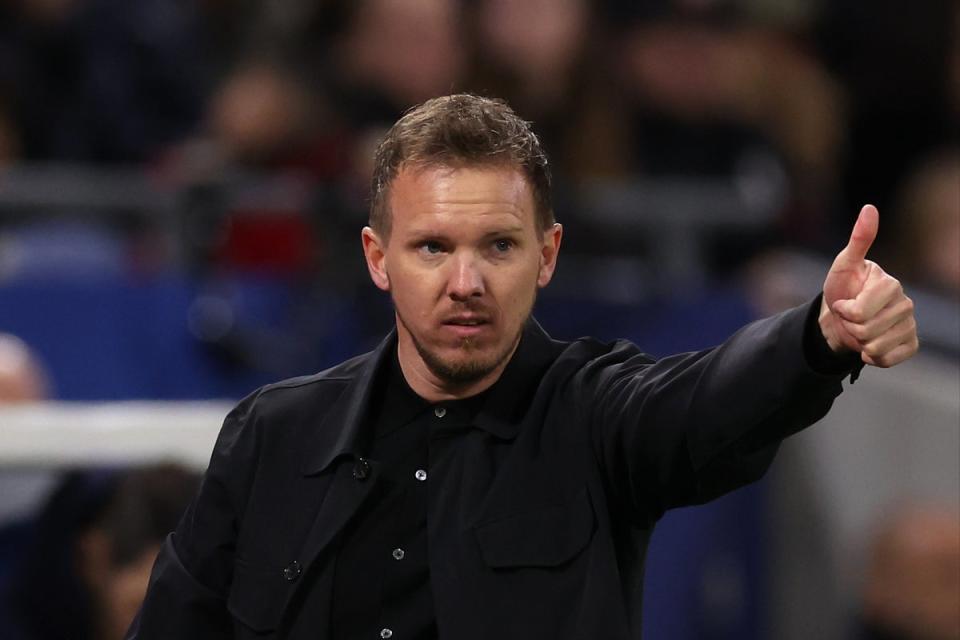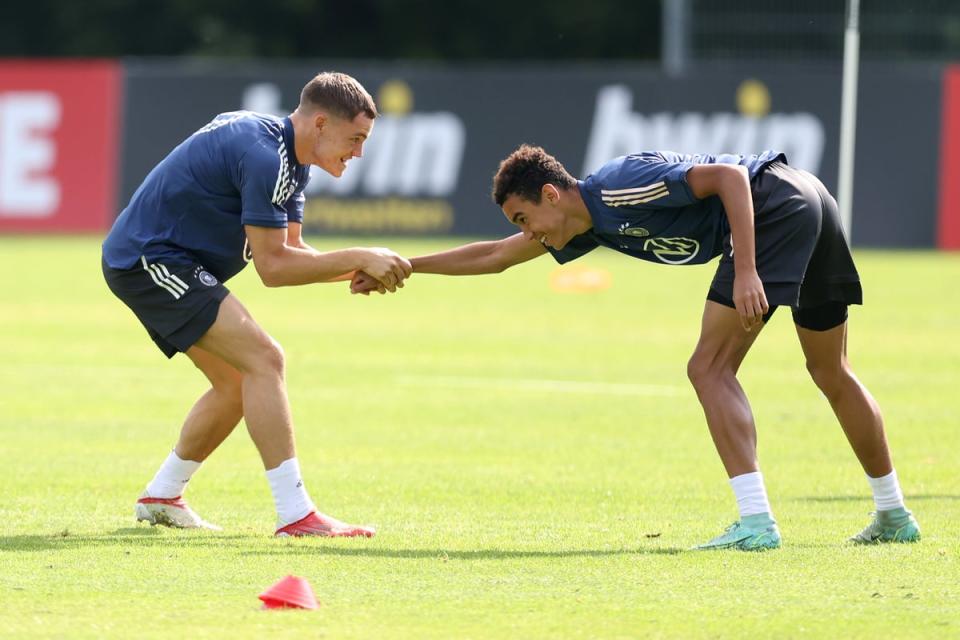Are Germany finally themselves again? Ominous signs show a new team can capture old glories

In recent years, the predominant feeling among German fans has been one of jadedness. But in recent months, that feeling has been replaced by an optimistic joy, and the next evolution would naturally be jubilation this summer – in the very cities where Germany’s footballing fate will be decided.
The source of initial disillusionment was naturally a decade of precipitous decline, after the cathartic lassoing of der vierte Stern in 2014 – “the fourth star” on Germany’s jersey, woven after their World Cup triumph in Brazil.
While Joachim Löw’s side mounted a respectable challenge at Euro 2016, falling to hosts France in the semi-finals, their world title defence was nothing short of disastrous. A bottom-place group finish in 2018 could have heralded the end for Löw, but he sought redemption in 2021, only for the postponed Euros to bring another premature exit: an underwhelming last-16 dismissal by England.
Yet replacing Löw, in a bid to reinvigorate the Nationalmannschaft, did not bear the fruit foreseen. Hansi Flick’s tenure was shockingly short and ill-fated, as Germany again crashed out of the World Cup at the first hurdle in 2022. Japan played a key role in their misfortune in Qatar, and in Flick’s departure overall, with their 4-1 win over Germany signalling the end for the former Bayern Munich coach last September.
Enter Julian Nagelsmann, within 12 days. At first, it seemed the 36-year-old’s spell might be as quick as his arrival, with his contract only lasting until the end of Euro 2024. But by April, the former Bayern manager had signed an extension, which is set to take him until the end of the 2026 World Cup.
The extension was somewhat surprising at the time. Despite coming in the immediate aftermath of wins over France and Netherlands, the move also followed defeats by Turkey and Austria, a draw with Mexico and an expected win over the USA. Nevertheless, the extension showed the Deutscher Fußball-Bund’s belief in Nagelsmann, whose spell has brought mixed results yet fresh faith from fans.

Similar to how Gareth Southgate’s clearest achievement with England – amid a share of unconvincing moments – has been the renewal of fans’ connection to the national team, Nagelsmann and his squad have Germans believing again. They have Germans enjoying watching their team again.
That enjoyment was evident in the March wins: 2-0 in France and 2-1 at home to Netherlands. Having trialled various XIs in his first few games in charge, Nagelsmann settled on the same starting line-up for both matches: Marc-Andre ter Stegen in goal; a back four of Joshua Kimmich, Antonio Rüdiger, Jonathan Tah and Max Mittelstädt; Robert Andrich and Toni Kroos anchoring the midfield, supporting a more advanced three of Ilkay Gündogan centrally and Jamal Musiala and Florian Wirtz wide; and Kai Havertz up top. In June’s 0-0 draw with Ukraine, Nagelsmann dropped Ter Stegen for Manuel Neuer and rotated centre-backs, but left the rest of the line-up. In their final friendly, a spirited 2-1 comeback over Greece, again Ter Stegen made way for Neuer – who helped set up Greece’s goal – while the rest of the highlighted XI remained.

Against France, it was Leverkusen’s Wirtz – still just 21 – who scored a wonder goal inside eight seconds, set up by Kroos’s quick thinking and deft pass. Later, Wirtz turned playmaker with a similar pass, allowing Musiala, also 21, a simple assist to Havertz. In the comeback against Netherlands, Stuttgart’s Mittelstädt scored his own screamer. The late winner was a Niclas Füllkrug header, with the Dortmund striker’s set-piece threat having earned him plenty of minutes under Nagelsmann – more recently as a substitute.
The corner came from Kroos, who is eyeing a fairytale ending to his career, having just ended his club run with a fifth Champions League title at Real Madrid. The 34-year-old, while as good as ever, will appreciate his partnership with Andrich, who at 29 can do more of the running in the double-pivot – as shown recently in Leverkusen’s title-winning campaign. Elsewhere on the pitch, Havertz’s timing could be crucial, as it was against France and again versus Greece, when he equalised with a cute touch, turn and finish.
Among other options, Nagelsmann can call upon veteran striker Thomas Müller, whose Bayern clubmate Leroy Sane offers danger on the wing. In defence, there is young Dortmund centre-back Nico Schlotterbeck, while Brighton midfielder Pascal Gross scored a brilliant half-volley against Greece, as Germany showed vital mettle in the 89th minute.

There is depth, and while there are a few seasoned veterans, the average age is 27; the balance very much tips towards young spirits, the kind that surged so far in 2010 and went all the way in 2014. Harnessing them is Nagelsmann’s challenge, but he has shown promise so far.
His systems shifted across his spells at Hoffenheim, Leipzig and Bayern, with 4-2-3-1 being his preferred formation at the latter club and now with Germany. Still, he has been known to experiment and to pull from his past, including playing three at the back against Austria – as he did at Hoffenheim and Leipzig. It was Ralf Rangnick, the father of gegenpressing, who recruited Nagelsmann at Hoffenheim and greatly influenced the young coach’s style, while Nagelsmann also played under Thomas Tuchel at Augsburg.
As such, viewers can expect plenty of possession from Germany this summer, but also plenty of gegenpressing when the hosts are without the ball. In fact, expect to see plenty of Germany full stop; expectations from abroad are low for the nationalmannschaft, but the home nation believes that a deep run is very much on the cards.

 Yahoo Sport
Yahoo Sport 



































































